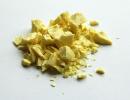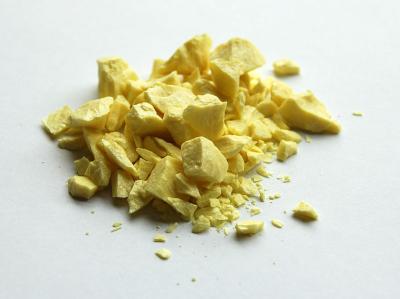
|
Sulphur pesticides in Kenya
|
| Some Pesticides Permitted in Organic Gardening | Contacts | |||
| General information on sulphur | Information Source Links |
Some Pesticides Permitted in Organic Gardening
Organic gardeners can use certain pesticides -- chemicals that are derived from botanical and mineral-bearing sources. These chemicals may be highly toxic, but they break down more rapidly than common chemicals, such as the Sevins, Malathions and 2,4,Ds.
The use of botanical and mineral-bearing pesticides, even though some are toxic, also can be incorporated into an Integrated Pest Management (IPM) approach to growing crops. IPM relies on a variety of pest control means rather than on one product or method. The pesticides discussed below are appropriate to include in IPM programmes.
Just as the more common chemicals are given toxicity ratings -- CAUTION, WARNING or DANGER -- so are chemicals from botanical and mineral-bearing sources. "CAUTION" means low toxicity; "WARNING" means moderately toxic and "DANGER" means highly toxic. The toxicity rating for each pesticide is provided in the paragraphs below.
General information on sulphur
Sulphur can be used as a dust, wettable powder, paste or liquid. Its primary use is to control powdery mildews, certain rusts, leaf blights and fruit rots. Spider mites, psyllids and thrips also are susceptible to sulphur. Most pesticidal sulphur is labelled for vegetables such as beans, potatoes, tomatoes, peas and fruit crops such as grapes, apples, pears, cherries, peaches, plums and prunes.
Sulphur has the potential to cause plant injury in dry hot weather (above 32°C). It's also incompatible with other pesticides. Don't use sulphur on plants within 20-30 days of applying spray oils. Sulphur reacts with the oil to cause phytotoxicity.
Copper fungicides were formerly accepted in organic farming in many countries provided that the number of applications was strictly followed and a proper soil amendment is observed to prevent copper accumulation in the soil, and can still be accepted with permission from the certifying authority.
Sulphur is non-toxic to mammals, but it may irritate eyes and skin. It has been given a CAUTION rating.
Lime Sulphur
Lime sulphur is made by boiling lime and elemental sulfur together. The mixture is used as a dormant spray on fruit trees to control diseases such as blight anthracnose, powdery mildew and some insects including scales, thrips and eriophyid mites. Its drawbacks include its rotten-egg smell, its potential to burn exposed skin and eyes and to injure plants if applied when temperatures exceed 26°C. Lime sulphur has been assigned a DANGER rating.
Sulphur pesticides in Kenya
Sulphur products listed in Table 1 are registered in Kenya by the Pesticide Control Products Board www.pcpb.or.ke . These products are readily available in most agro-vet shops in Kenya. Organic farmers should consult their respective certification agencies prior to use of these products. According to the Soil Association (UK)
www.soilassociation.org farmers do not require permission to use sulphur, however, sulphur can only be used where there is an actual threat to the crop (i.e. not used as preventive applications).
Table 1: Sulphur pesticides commercially available in Kenya
| Trade names of products | Active substances of products | Target pest/disease | Agent/distributor |
| Cosavet DF | Sulphur 80% w/w | Powdery mildew on roses and vegetables | Osho Chemical Industries Ltd |
| Devisulphur WP | Sulphur 80% w/w | Powdery mildew on vegetables | Orbit Chemical Industries Ltd |
| Flosul Plus | Sulphur 80% w/w | Powdery mildew on roses and vegetables | Osho Chemical Industries Ltd |
| Microthiol Special Dispers 80 WG | Sulphur 80% w/w | Mites and powdery mildew in French beans, cucumber, tomato and roses | Twiga Chemical Industries Ltd |
| Palm Brand | Sulphur 99% w/w | Powdery mildew on flowers | Osho Chemical Industries Ltd |
| Sulgro 80 WDG | Sulphur 80% w/w | Powdery mildew on roses | Topserve (EA) Ltd |
| Thiovit Jet WP | Sulphur 80% w/w | Mites and powdery mildew on grape vine, citrus, coffee, tea and ornamentals | Farmchem (K) Ltd |
| Wetsulf WP | Sulphur 80% w/w | Powdery mildew on flowers | Osho Chemical Industries Ltd |
Contacts
Agents / Distributors of Sulphur Pesticides in Kenya
FARMCHEM (K) LTD
Tel.: +254 (20) 2409661
Mobile: +254 722 520837 / +254 733 520837
Email: farmchem@farmchemafrica.com
Website: www.farmchemafrica.com
Tel.: +254 (20) 2409661
Mobile: +254 722 520837 / +254 733 520837
Email: farmchem@farmchemafrica.com
Website: www.farmchemafrica.com
ORBIT CHEMICAL INDUSTRIES LTD
Tel.: +254 (20) 2338200/2
Mobile: +254 722205505/733333938
Email: orbit@orbitchem.com
Website: www.orbitchem.com
Tel.: +254 (20) 2338200/2
Mobile: +254 722205505/733333938
Email: orbit@orbitchem.com
Website: www.orbitchem.com
OSHO CHEMICAL INDUSTRIES LTD
Tel.: +254 (20) 3756222
Mobile: +254 726880480 / +254 733880480
Email: oshochem@oshochem.com
Website: www.oshochem.com
Tel.: +254 (20) 3756222
Mobile: +254 726880480 / +254 733880480
Email: oshochem@oshochem.com
Website: www.oshochem.com
TOPSERVE (EA) LTD
P.O. Box 47341-00100 Nairobi
Tel.: +254 (20) 3746402/3/6
P.O. Box 47341-00100 Nairobi
Tel.: +254 (20) 3746402/3/6
TWIGA CHEMICAL INDUSTRIES LTD
Tel.: +254 (20) 3942000/39423000
Email: info@twiga_chemicals.com
Website: www.twigachemicals.com
Tel.: +254 (20) 3942000/39423000
Email: info@twiga_chemicals.com
Website: www.twigachemicals.com
Information Source Links
- OISAT: Online Information Service for Non-Chemical Pest Management in the Tropics. www.oisat.org

 Back
Back
